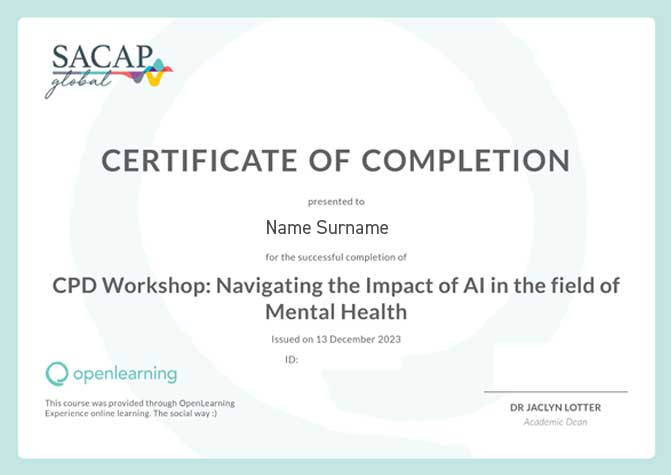Navigating the Impact of AI in the Field of Mental Health
R450.00

Workshop Overview
AI, friend or foe? The ongoing questions of how to use AI’s potential while dealing with its ethical challenges affect nearly every profession, including Mental Health.
In just over a year since its impressive launch, OpenAI has established itself as an influential player on the world stage. Whether seen as a friend or an adversary, its impact is clear.
This CPD workshop explores AI in the context of Mental Health, looking at both its benefits and its current limitations. It specifically addresses the major mental health challenges in South Africa, which include a growing resource gap and legal obstacles. Given this backdrop, it’s crucial to consider the role AI can play now and in the future.
The online workshop seeks to introduce participants to the effects AI has already had on mental health, while also pointing out the ethical issues that come with this new technology. There will be a strong emphasis on how to ensure AI integration follows ethical guidelines without harming client well-being.
What are the entry requirements?
Anyone 18 years of age or older can sign up for this online workshop. There are no academic entry requirements or conditions.
Who is this workshop for?
This workshop is for anyone curious about how mental health practices can incorporate AI tools and technologies.
What is the time commitment?
A total of 3 hours is required to complete the workshop.
What do you need to do the workshop?
- Access to Microsoft Word
- Google Chrome (recommended)
- Stable internet connection
Is the workshop assessed?
Learners are required to complete an assessment comprising of reading a journal article and answering a 15-question multiple choice questionnaire.
Is the workshop accredited?
The online workshop is accredited by the Health Professions Council of South Africa (HPCSA).
What can you do after completing this workshop?
HPCSA registered professionals will receive 3 CPD points [3 CEU Continuing Education Units points] upon successful completion of the workshop.
Course highlights

-
Build skills to ensure AI integration aligns with ethical principles without compromising client well-being.
-
Explore the present and future potential application of AI technologies in mental health.
-
Address critical issues such as privacy, informed consent, and the impact of legislative limitations and bias.
Dates and Registration
Class of 2025: 1 January – 31 December
Participants can register at any time and move through the workshop content. Watch the live workshop recording and complete the online journal articles and multiple-choice questionnaire.
NOTE: HPCSA registered professionals who want to claim 3 CPD points [3 CEU Continuing Education Units points] need to complete the online assessment within 5 days after registering.
Learner Experience
Certification
This CPD workshop has been designed for mental health professionals interested in knowing more about some of the innovations that have taken place over the last decade, as well as framing the ethical concerns that prevail in this new, innovative space. Once you have completed the course, you will receive a digital certificate of completion.

The certificate serves as evidence of your new skills and knowledge and can be used to demonstrate your commitment to professional development.
Attend a live online session, or watch the recording, and complete an online reading and assessment.
HPCSA registered professionals will receive 3 CPD points [3 CEU Continuing Education Units points] upon successful completion of the workshop.
Workshop Overview
- Introduction of the topic and overview of the workshop.
- Evolving human-AI relationship.
- Emphasis on HCI’s user-centric design.
- Accessibility and usability in AI interfaces.
- Ethical interaction as a core principle.
- Policy development and implementation gap.
- Current mental health infrastructure challenges.
- Service delivery challenges.
- Brief overview of AI technologies currently in use in mental health fields.
- Potential exacerbation of mental health.
- The curious case of chatbots.
- Ethical challenges in use of AI and GenAI (privacy, informed consent, legal responsibility, and bias).
- Impact of the digital divide.
- Identifying best practices for incorporating AI into mental health practices without compromising ethical standards.
- Concluding thoughts on ethical of use of AI in mental health.
Learning Outcomes
By the end of the workshop practitioners will:
- Acknowledge that many ethical concerns don’t have immediate solutions, some of the key ethical considerations will be explored.
- Empower mental health practitioners as they embark on the seemingly inevitable integration of this new technology into their professional lives.
- Provide insights that foster a thoughtful and informed approach to the evolving intersection of AI and Mental Health.
- Critically reflected on the mental health landscape in South Africa.
- Explore the present and future potential application of AI technologies in mental health, as well as a brief overview of their implications for exacerbating or alleviating mental health challenges.
- Understand the unique impact of chatbots, specifically considering their role, efficacy, and limitations as an adjunct to traditional therapy.
- Develop insight into the matrix of AI and mental health, addressing critical issues such as privacy, informed consent, and the impact of South African legislative limitations and bias.
- Understand how to ensure AI integration aligns with ethical principles without compromising client well-being.
Workshop Presenters

Clare Chester is a registered Counselling Psychologist and has been practising for 25 years. She has always been passionate about higher education and worked at a student counselling centre for the first 13 years of her career. Clare is a full-time Educator at SACAP, teaching across a variety of subjects and cohorts, with a special interest in Ethics and Crisis and Trauma Counselling.

Carl Badenhorst is the Head of Learning Design and Online Teaching at SACAP. He loves creating meaningful learning experiences through technology and creative methodologies, and integrating the latest advancements in generative AI and human-computer interaction. Carl is committed to pushing the boundaries of traditional education, advocating the use of AI to simulate real-world scenarios and immersive experiences.
The Team
The SACAP Global team brings a wealth of knowledge and practical experience across various disciplines. Our expert short course developers and dedicated support team are passionate about sharing their insights to help you get the most out of your online learning journey.























